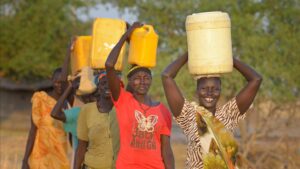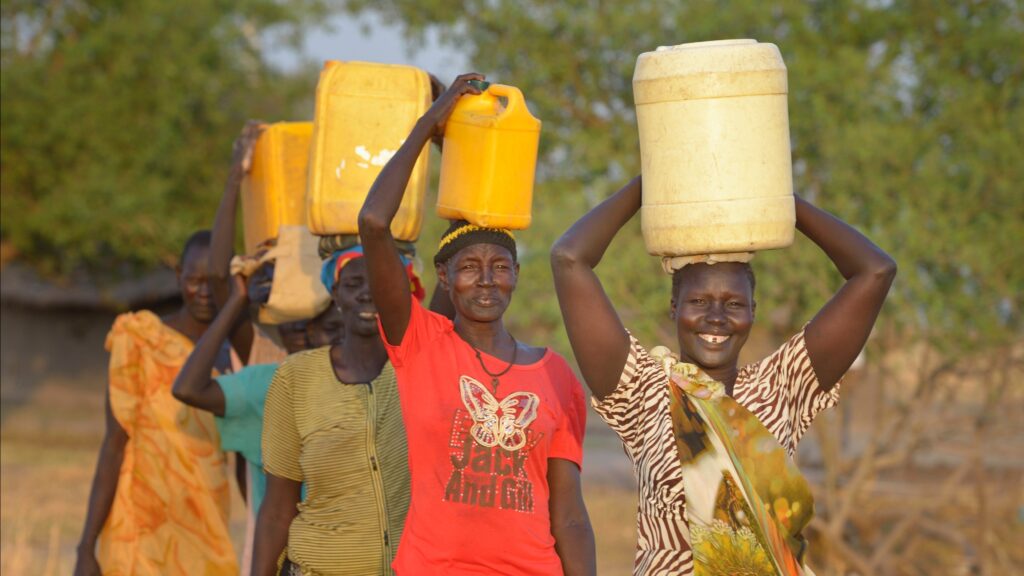Water on Wall Street: the ultimate abuse of God’s gift

The 5th reflection of the Seven Weeks for Water 2021 of the WCC’s Ecumenical Water Network (EWN) is written by Susan Smith and Dinesh Suna.* In the following reflection, they condemn the recent listing of water on Wall Street as a tradable commodity. Referring to the biblical assurance that God will quench the thirst of the poor and needy and that water should be made available to all even if they have no money, they proclaim the true value of water as a gift from God, a human right, a spiritual wonder and the source of all life.
Texts
Isaiah 41:17-20
Isaiah 55:1
Reflection
Isaiah 41 makes it clear: water is God’s gift to all creation. To quench the thirst of the poor and needy, God creates rivers on bare plateaus and fountains in the midst of the valleys, makes the wilderness a pool of water and the dry land springs of water, and places cedar, acacia, myrtle and olive in the wilderness, and cypress, plane, and pine in the desert. The Creator provides these wonders for us; we understand that water and the creation dependent upon it are sacred, and that God has provided water for everyone, especially the poor and the needy. Furthermore, in Isaiah 55, God promises that no one should be deprived of water. Even if they have no money, they must get access to drinking water.
It is dangerous, then, when we reduce the value of wondrous water to money, when we think of it as an economic “good,” a mere input to production, or a commodity bought and sold on Wall Street. The danger is that we become cynical about water: we know its price, but we become unable to appreciate its value as the source of all life. In our mind, water becomes just another way to make an easy buck.
Looking at water as just another economic good leads us to abuse God’s gift of water. We drink bottled water instead of tap water for mere convenience; that practice wastes a full litre of water in the bottling process for every litre we drink and pollutes our planet with plastic. We allow water to be cut off to the poor in cities like Flint and Detroit. Families who have had their water shut off for non-payment seek to survive without tap water. These shutoffs have occurred even in the midst of the coronavirus pandemic in which public health experts continually advise us to wash our hands frequently to avoid a debilitating and deadly disease.
Treating water as just another input to growing crops or making other products encourages agricultural and industrial waste of water. Statistics shows us that 70% of freshwater usage accounts for agriculture yet that one-third of food produced, gets wasted. Large scale farming and industrial manufacturing deplete rivers to the point that fish and other creatures die. The Colorado River, the longest river in North America, is so depleted by agricultural, industrial and municipal withdrawals that it no longer reaches the sea. More than a dozen major American rivers are still similarly dry.
Industrial agriculture and manufacturing industries defile our rivers and groundwater with toxic pollution. The waters of nearly half of our rivers and one-third of our lakes are so polluted that they are unfit to swim in, much less drink. Human activities also pollute many drinking water aquifers with chemicals that render them far too toxic to drink.
Human greed has led to another major and historic abuse of water. We now allow Wall Street speculators to buy and sell water futures. The rich, with no need for the water they buy, can now profit by buying and selling contracts that allocate water in California during future years. These greedy speculators bet on the future value of the water and thus control the allocation of water that the citizens of California legally own and should control. Should some group of speculators manage to corner the California water market (currently worth a mere billion dollars), they can force the price of water sky high and force farmers to fallow their land rather than pay exorbitant amounts for water. This is the most damning, truly unthinkable abuse of water wholly disconnected from wise use of our most precious resource. The UN special rapporteur for the human right to water outlines the priority of usage of water in line with his mandate:
“Water for life:” water used and required for human life should be of the highest priority. · “Water for people:” water used for domestic and personal usage including sanitation services comes next. “Water for the economy:” water used for legitimate activities for economic development should not take priority over “water for life” and “water for people.”
Therefore, these abuses of God’s gift of water result from human greed. As Jesus repeatedly warned us, no good can come of loving money more than God’s creation, more than the poor and the needy, or more than God. Let us reclaim water from those enamoured of money and proclaim the true value of water as a gift from God, a human right, a spiritual wonder and the source of all life.
Questions
- Where do you feel awe and wonder in the presence of God’s water – which lake, spring, stream, river, or ocean?
- Imagine how you would feel if that place became dry because of human greed. Would you help prevent that from happening – and what could you do?
Actions
- Use a reusable water bottle and fill it with safe or filtered tap water, rather than using bottled water. As you fill it each morning, say a short prayer for God’s gift of water.
- Become active in a local or national group that supports the human right to water and opposes commodification of water. Ask the group to consider creating a campaign against speculative water markets.
Resources
- Understanding the evils of water futures markets.
- Food & Water Watch on corporate control of water, corporate control
- Corporate Accountability water campaign, link
- UN special rapporteur statement on water futures, link
- UN special rapporteur report on water privatization, link
* Susan Smith is Professor of Law and Director of the Certificate Program in Sustainability at the Willamette University, USA. She represents the United Church of Christ at the International Reference Group of the Ecumenical Water Network (EWN) of the WCC. Dinesh Suna, a Lutheran from India, coordinates the WCC EWN from Geneva

